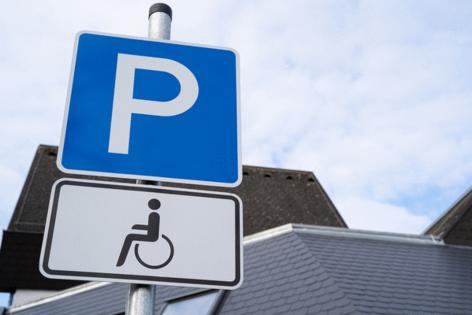Should pregnant women park in disabled parking spots in Florida? Lawsuit says no
Published in News & Features
MIAMI — A woman is suing the Florida Department of Highway Safety and Motor Vehicles over a state law that allows pregnant women to park in disabled spaces, arguing expectant mothers should not be entitled to the spaces dedicated for individuals with disabilities, including herself.
The state law went into effect July 1 after it was signed by Gov. Ron DeSantis in June. It lets pregnant women obtain permits to park in disabled parking spaces for up to one year.
Plaintiff Olivia Keller, 48, who lives in Leon County with her husband, says that law makes parking less accessible to her and other people with disabilities. Her complaint filed in the Northern District of Florida on Oct. 27 argues that the statute violates the Americans with Disabilities Act.
“I have worked incredibly hard to get to where I am in my life,” Keller said in an emailed statement to McClatchy News on Thursday. “For someone with a disability to go to college, build a career, own a home, and be married was unfathomable even in the generation preceding me. While parking may seem unimportant to most people, disabled parking has been one of my most valuable tools.”
“Without these spaces, I wouldn’t have been able to do all of the things I have done, including go on my first date with the man I have built a life with over the past 11 years,” Keller added.
The Florida Department of Highway Services did not immediately return McClatchy News’ request for comment Thursday.
Keller, who is the public policy manager for a national nonprofit, uses a power wheelchair and a modified minivan that has a mobility ramp.
She was born with a rare condition, upper bilateral amelia, meaning she was born without two arms, as well as scoliosis and a “right leg length discrepancy,” according to the complaint.
Before the state allowed pregnant women in disabled parking spaces, it had been difficult for Keller to find an available spot, the complaint says, as she “can only park in van accessible disabled parking spaces with access aisles.”
The challenge has led to Keller arriving hours early to work and to medical appointments to make sure she has a place to park, according to the complaint. It also affects her ability to shop for her needs and participate in social and community activities.
“The inclusion of expectant mothers in disabled parking spaces has further exacerbated these challenges, reducing the likelihood that Ms. Keller will find accessible parking when needed,” her attorney, Matthew Dietz, a law professor at Nova Southeastern University, wrote in the filing.
Dietz is the clinical director of the Disability Inclusion and Advocacy Law Clinic at the university’s Shepard Broad College of Law. He is representing the case for free with his students involved in the clinic.
“As a law professor and director of the NSU disability rights clinic, it is essential to teach aspiring lawyers that they have an affirmative duty to protect the rights of those who are often ignored, and to ensure that those voices are heard,” Dietz told McClatchy News via email. “It is even a greater duty in times like now, when fear, indifference, or convenience tempt most others to look away.”
Criticizing the new state statute allowing expectant mothers to obtain permits for disabled parking spaces, Dietz said: “The fact that a law like this could be passed demonstrates a total lack of awareness of the needs of the one in four adults in the state of Florida who live with a disability.”
The lawsuit says that more than 1.3 million Florida residents, out of more than 18.5 million drivers in the state, have a permanent disabled parking permit. In addition to this, some drivers have temporary parking permits for disabilities.
Before the law’s passage, it was sponsored by Rep. Fiona McFarland, Law.com reported.
While speaking on the bill at a legislative session in March, the lawsuit notes that McFarland said she was inspired to advocate for it when she was nine months pregnant, recalling herself struggling to walk across a parking lot in the summer in the Florida heat, the lawsuit notes.
She expressed that she does not view pregnancy as a disability, and said she wants “to be able to park up front,” the filing notes.
Now accessible parking is less available to Keller and others with disabilities, according to the complaint.
With her lawsuit, Keller wants the court to declare that Florida’s law violates federal disability law and seeks a permanent injunction that will prevent the state from issuing disability parking placards to pregnant women.
Keller told McClatchy News that losing access to parking “not only jeopardizes employment opportunities and doctor’s appointments.”
“It also keeps me from having date nights with my husband, having coffee with friends, going to get my hair done, get pedicures, attend First Friday events, Christmas parades, and New Years events in my community, isolating me from the community around me,” she said.
“When all I’m able to do is drive by all the places I want to go without actually being able to go inside when I get there I feel like a prisoner trapped in my car, only getting to see the world from afar without being able to join it,” Keller added.
_____
©2025 Miami Herald. Visit miamiherald.com. Distributed by Tribune Content Agency, LLC.







Comments